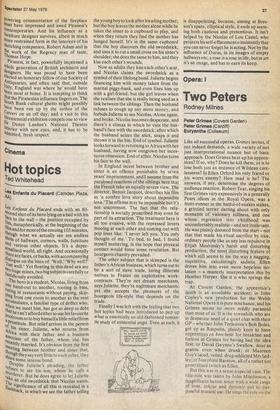Cinema
Hot topics
Ted Whitehead
Lee Enfants du Placard (Camden Plaza, AA) l'es Enfants du Placard ends with an 80cond shot of its hero lying on a bed with his 'Lace to the wall — the position occupied by :!1,111, metaphorically, at the beginning of the 1,!.111 and for most of the ensuing 103 minutes, Lnough what we actually see are endless shots of hallways, corners, walls, furniture ilnd various other objects. It's a deper8tettalised world, all right. And occasionally ,ihere are faces, or backs, with accompanying l'Illogue on the lines of: 'Well.' well?' 'dust well.' Yet floating in this dead sea are tflvo huge mines, two big subjects carefully or astidiously avoided. The hero is a student, Nicolas, living from °Ile hand-out to another, rooting in bins, !sit:ling in restaurants without paying, skip"mg from one room to another as the rent accumulates, a familiar type of drifter who, Wthhen we meet him, has got so deep in debt nr,at he can't afford either to use his favourite "it °room or to buy himself a little relieffrom ,srrostitute. But relief arrives in the person his sister, Juliette, who returns from 'Africa with their father and a business !aseciate of the father, whom she has leeently married. It's obvious from the first trnheeting between brother and sister that, snIgh they say very little to each other, they uare some intense bond.
r cUeSPite Juliette's pleading, the father eluses to see his son, whom he calls a tUt urderer. But he does agree to let Juliette an old swordstick that Nicolas wants. n'IC significance of all this is revealed in a “ashback, in which we see the father telling
the young boy to look after his ailing mother; but the boy leaves the mother alone while he takes the sister to a cupboard to play, and when they return they find the mother has hanged herself. It's in the same cupboard that the boy discovers the old swordstick, and uses it to cut a small cross on his sister's shoulder; she does the same to him, and they kiss each other's wounds.
Now as adults they kiss each other's scar, and Nicolas claims the swordstick as a symbol of their lifelong bond. Juliette begins financing him with money taken from the marital piggy-bank, and even fixes him up with a girl-friend; but the girl leaves when she realises that she is really being used as a link between the siblings. Then the husband refuses to cough up any more money, and forbids Juliette to see Nicolas. Alone again, and broke, Nicolas becomes desperate, and there's a climax in which he cuts the husband's face with the swordstick; after which the husband seizes the stick, snaps it and throws it in the bin. End of symbol. Juliette looks forward to returning to Africa with her husband, having now outgrown her incestuous obsession. End of affair. Nicolas turns his face to the wall.
In England incest between brother and sister is an offence punishable by seven years' imprisonment, and I assume from the paralysed reactions of the siblings here that the French take an equally severe view. The director, Benoit Jacquot, describes his film as 'a sombre love story about impossible love.'The offense may be impossible but it's not uncommon. The fact that the relationship is socially proscribed may even be part of its attraction. The treatment here is all too evasive, with the repressed lovers mooing at each other and coming out with pop lines like: 'I never left you. You only thought of me.' To bed, to bed, I found myself muttering, in the hope that physical contact would force some revelation. But bourgeois chastity prevailed.
The other subject that is skimped is the father's African business, which turns out to be a sort of slave trade, luring illiterate natives to France on exploitative workcontracts. They're not dream merchants, says Juliette, they're nightmare merchants; yet she accepts the pleasures of the bourgeois life-style that depends on the trade.
Finally I was left with the feeling that two hot topics had been introduced to pep up what is essentially an old-fashioned romantic study of existential angst. Even as such, it is disappointing, because, aiming at Bresson's spare, elliptical style, it ends up seeming both cautious and pretentious. It isn't helped by the Nicolas of Lou Castel, who projects his self-effacement o insistently that you can never forget he is acting. Nor by the influence of Duras, in its images of empty hallways etc; a rose is a rose in life, but in art it's an image, and has to earn its keep.


































 Previous page
Previous page